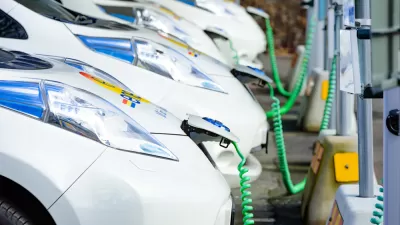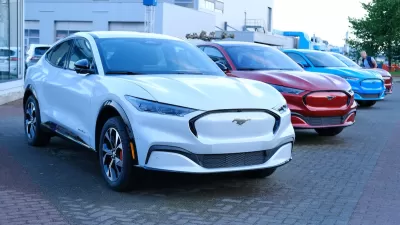Just 13 electric car models are now eligible for federal tax credits.

New federal rules that went into effect on January 1 cut the number of electric vehicles eligible for a federal tax credit to just 13 models, reports Ari Natter in Bloomberg CityLab.
The revised criteria exclude vehicles with batteries built by Chinese manufacturers, Natter explains. “In 2025, the restrictions will expand to include suppliers of key raw materials for batteries, such as nickel and lithium.”
According to Natter, “Among the vehicles still eligible for the full or partial consumer credit are the Model Y by Tesla Inc., Rivian Automotive Inc.’s R1T pickup truck, Stellantis NV’s Jeep Wrangler 4xe and Ford Motor Co.’s F-150 Lightning pickup truck.”
Models no longer eligible include the Tesla Cybertruck, some versions of the Model 3, the Nissan Leaf, Ford E-Transit van, and GM Blazer and Silverado.
FULL STORY: Electric Car Models Eligible for $7,500 Tax Credit Cut to 13

Planetizen Federal Action Tracker
A weekly monitor of how Trump’s orders and actions are impacting planners and planning in America.

Restaurant Patios Were a Pandemic Win — Why Were They so Hard to Keep?
Social distancing requirements and changes in travel patterns prompted cities to pilot new uses for street and sidewalk space. Then it got complicated.

Map: Where Senate Republicans Want to Sell Your Public Lands
For public land advocates, the Senate Republicans’ proposal to sell millions of acres of public land in the West is “the biggest fight of their careers.”

Orange County, Florida Adopts Largest US “Sprawl Repair” Code
The ‘Orange Code’ seeks to rectify decades of sprawl-inducing, car-oriented development.

Maui's Vacation Rental Debate Turns Ugly
Verbal attacks, misinformation campaigns and fistfights plague a high-stakes debate to convert thousands of vacation rentals into long-term housing.

San Francisco Suspends Traffic Calming Amidst Record Deaths
Citing “a challenging fiscal landscape,” the city will cease the program on the heels of 42 traffic deaths, including 24 pedestrians.
Urban Design for Planners 1: Software Tools
This six-course series explores essential urban design concepts using open source software and equips planners with the tools they need to participate fully in the urban design process.
Planning for Universal Design
Learn the tools for implementing Universal Design in planning regulations.
Heyer Gruel & Associates PA
JM Goldson LLC
Custer County Colorado
City of Camden Redevelopment Agency
City of Astoria
Transportation Research & Education Center (TREC) at Portland State University
Camden Redevelopment Agency
City of Claremont
Municipality of Princeton (NJ)





























